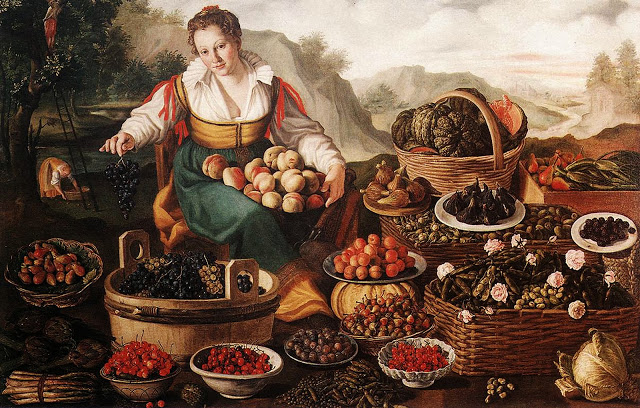Unwelcoming Gluttony from the Table of Sophia

The proverbial imagination pictures Wisdom as a noble lady who prepares a feast and invites any who would come: “Wisdom has built her house; she has hewn her seven pillars. She has slaughtered her beasts; she has mixed her wine; she has also set her table. She has sent out her young women to call from the highest places in the town, ‘Whoever is simple, let him turn in here!’ To him who lacks sense she says, ‘Come, eat of my bread and drink of the wine I have mixed. Leave our simple ways, and live, and walk in the way of insight’” (Proverbs 9:1-6).
This is the table at which we’ve been feasting all summer, through pleasure reading and conferences and the beautiful landscapes of our travels. This is the table that, as Lady Wisdom’s handmaids, we now seek to set for our students as we plan the school year to come.
But perhaps, in the midst of the feast, you have discovered among the guests an impostor at your elbow. Gaudy and slovenly, a loud chewer and heedless gulper, punctuating incessant chatter with requests for third and fifth and tenth helpings: at the table of Sophia, you’ve been seated beside Gluttony.
We fool ourselves if we think we leave Gluttony in the kitchen: he stalks us to the study where we seek to pursue wisdom. That habit of constantly skimming to “get through” a massive booklist, even when the text ought to be chewed slowly; the feeling of being cheated if you must miss a whole two of the twenty talks at the conference; the impulse to order all the books in the curriculum catalogue or to carry home the book table when half your house is already wallpapered in bookshelves; the cramming of dozens of Great Books or great concepts into a semester-long class; the proliferation of assignments . . . how often do we trade understanding for consumption, and fail to perceive that our “love of learning” may be Gluttony’s masquerade?
Like children who chew furiously, frantically devouring their dessert quickly in order to get more, we trade deep learning for “more” learning and so miss the very wonder and formation that we seek. But how do we recognize this vice? Do we wait for our heads to feel full like our stomachs, our brains to get tired like our jaws?
Perhaps the answer does begin in the analogy, and a better understanding of gluttony is needed first.
The great theologians took pains to distinguish the goodness of food, of eating, and of the pleasure these give from the evil of what Aquinas calls “inordinate concupiscence in eating” (Summa Theologica Part 2-2, Question 148, Article 4)—in other words, lustful eating, eating past the point of hunger or pleasure, eating that replaces love of God and neighbor as a final end.
With scholastic precision, Aquinas defines five species of gluttony. Three have to do with the kind, quality, and quantity of the food itself: one may desire food that is too costly or “sumptuous”; one may be overly particular about the way that food is prepared; or one may eat too much food. Two have to do with the manner of eating: eating at an improper time, or eating in a greedily uncouth way.
Similarly, while affirming the goodness of study and of love for learning, can we not discern an abuse that parallels the abuse of eating? The analogy can even be inferred from a later question in the Summa that links temperance (the opposite of gluttony) to studiousness, claiming that, since temperance “moderate[s] the movements of the appetite,” and the desire for knowledge is an appetite of the soul, therefore “studiousness is a potential part of temperance” (Part 2-2, Question 166, Article 2). With this linkage justifying our analogy, we could almost fit Aquinas’s species of gluttony onto the abuses of study.
First, we might insist on an education program or curriculum that is too costly, either in terms of money or time or attentiveness, relative to what students and teachers can faithfully invest. We might so drain them of these resources that they cannot provide for other needs, whether of money, family, church, or community.
Second, we might become so tangled in the particulars of how our learning is “prepared”—in other words, the methods we use to teach—that we lose sight of the end of learning itself. For instance, as I have been assiduously comparing my library of old rhetoric textbooks with the three new ones I acquired this summer, and minutely weighting the benefits to my students of different ways of introducing the topics or practicing the modes of persuasion, I’m keenly aware of the tendency to place so much weight on method that purpose is crushed.
Third, we might attempt to learn too much. How many books worthy of a lifetime’s contemplation should we really assign in one year? How many chapters in a week? How many math lessons will we power through if the early ones are not mastered? These sorts of questions prove dicey. Reaching points of completion is important; we remain accountable to some of the benchmarks of the standardized education system; and there’s a sense in which students’ early years ought to introduce them to the many things they will spend their whole lives understanding, rather than forcing them into that understanding prematurely. Still, the temptation of “too much” is a menacing undertow in the classical education ocean.
Fourth, we might push learning at improper times. In education as in all things, wisdom means recognizing the times and acting in season. Some concepts can be learned only when children reach a certain stage of development. Some times of the year are better for introducing new ideas, some for reviewing and resting. Some times of the day can be run through, others walked. Some times of a student’s life are ripe for personal challenge; at others, such conversations will fall on rocky ground and build resentment.
Fifth and finally, we might unwittingly model or encourage an improper attitude in learning. When we make apologies for what we teach—“Now this lesson will be boring, but stick with me, it’s important”—we encourage students to be apathetic and uninterested. When we rush to cover curriculum, we model learning that’s about (illusory) completion instead of formation. When we indulge in boastful comparison of our classical model with other systems, we risk triggering students’ vanity instead of cultivating a proper humility.
What Aquinas defines theologically, Dante pictures imaginatively. In his Inferno, the gluttonous suffer submersion in filthy mire created by a “round of rain / eternal, cursed, cold, and falling heavy” that includes “Thick hail and dirty water mixed with snow” and makes the earth itself stink (Canto VI, lines 7-8, 10, 11). The description almost hints that the gluttonous find themselves soaking in the slime of digested mass that was the product of their sinful pleasure. And gluttonous learning, like gluttonous eating, can leave us mired in the formless, stinking product of our haste and greed.
How do we escape the mire? Or, better yet, avoid it altogether? The gluttonous souls of Dante’s Purgatorio were purged through fasting, and doubtless we should consider what it might mean to practice this discipline in our schools. Like digestion, reflection happens when consumption pauses.
But the opposite and the cure of gluttony is not only fasting; it is also feasting—feasting temperately, joyously, leisurely, with state and savor. Sophia’s table is set, and the banquet awaits. In all our learning, we must learn to feast.

Lindsey Brigham Knott
Lindsey Knott relishes the chance to learn literature, composition, rhetoric, and logic alongside her students at a classical school in her North Florida hometown. She and her husband Alex keep a home filled with books, instruments, and good company.









